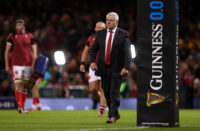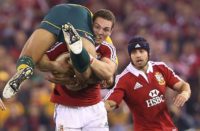 When they opened the roof after the Wallabies had done their level best to bring the house down, Wales were left to stare at the vapour trails in the sky.
When they opened the roof after the Wallabies had done their level best to bring the house down, Wales were left to stare at the vapour trails in the sky.
Those perceptive enough to read the signs found they contained a disturbing message. Australia would be all the better for next year's annual autumn bash in Cardiff and they would be even better still the following year for the one that really matters – the World Cup tie at Twickenham.
Once again, the Wallabies had shown that on their side of the equator, a Six Nations' Grand Slam doesn't count for much. The Welsh management reacted by trying to convince anyone who would listen that they were “in great shape”, a strange verdict given that they had just lost to the same opponents for the ninth time in five years.
No amount of talk by no amount of Welsh players about the New Year goal of a third straight Six Nations title was going to wash. Sam Warburton knew the score and, as usual, hit the nail on the head in the context of the 2015 World Cup.
“You can't call yourselves contenders until you've beaten one of the Southern Hemisphere's big teams,” the subdued Wales captain said. “Credit to England in that respect. They seem to do it every year.”
Since 2000, England have beaten the Big Three ten times more often than Wales. England's 20 wins (three against New Zealand, seven against South Africa, ten against Australia) came from 50 matches.
Wales have managed two (both against Australia) in 43, a record of chronic failure which is grossly inferior to France (13 wins in 45 matches), Ireland (six in 33) and Scotland (four in 30).
Only Italy (played 25, lost 25) have fared worse, no more than par for the course given their perennial struggle. It can be safely said, without stretching the golfing analogy too far, that Wales have been dealing in triple bogeys for far too long.
Australia's achievement in rising Phoenix-like from the ashes of the Lions series makes them more of a hazard at the World Cup than anyone in Wales, or England, could have imagined only a few weeks ago.
The Wallabies did far more than beat Wales. For more than half an hour, they outclassed them in a manner which raised awkward questions about the collective Welsh ability to learn their lessons.
Last year they lost in the final seconds because they kicked the ball long, a mistake which the Australians turned into Kurtley Beale's match-winning try. Last weekend, when their only hope was to keep ball in hand, Rhys Priestland tried a high-risk grubber with no room for error which served only to put Wales out of their misery.
Watching back home, Bob Dwyer witnessed the re-birth of Australia as serious World Cup contenders for the first time since they last won the pot of gold, at the Millennium Stadium 14 years ago.
“For three-quarters of the game, it was the best I've seen Australia play for ten years,” their former World Cup-winning coach said. “This has been a watershed tour. Full marks to Ewen and his coaching team.”
McKenzie watched the match all over again on the flight back to Sydney and identified “areas where we can get better”. While Wales keep pointing to their absentees (Jamie Roberts, Jonathan Davies, Adam Jones), the Wallaby list is longer (Beale, Pat McCabe, Scott Higginbotham, Hugh McMeniman, David Pocock, Wycliff Palu, Ben McCalman among others).
The current Wallaby XV are all in their 20s with one exception, hooker Stephen Moore (30). Wales, in contrast, have seven on the wrong side of 30 – Gethin Jenkins (33), Adam Jones, Ryan Jones who will both be 33 before the end of the Six Nations, Mike Phillips (31), Paul James (31), Luke Charteris (30) and Richard Hibbard (30 next week).
Gatland will be pushing his luck if he expects them all to have enough elastic left for one more World Cup. The last month has shown all too clearly that the quality of Wales' supporting cast is a long way short of the depth required of serious challengers to New Zealand's crown.
Their invincible year, deservedly reflected in the IRB's choice of Kieran Read and Steve Hansen as best player and coach respectively, puts them out on their own, as reflected in our table.
It has been based not on every Test result but those between the top ten nations. In the case of the All Blacks that eliminates their fixture against Japan, likewise Wales' two second string fixtures against the same opposition and Australia's three-match series against the Lions.
2 Comments
Leave a Comment
You must be logged in to post a comment.



























Pingback: useful content
Pingback: faceless youtube automation